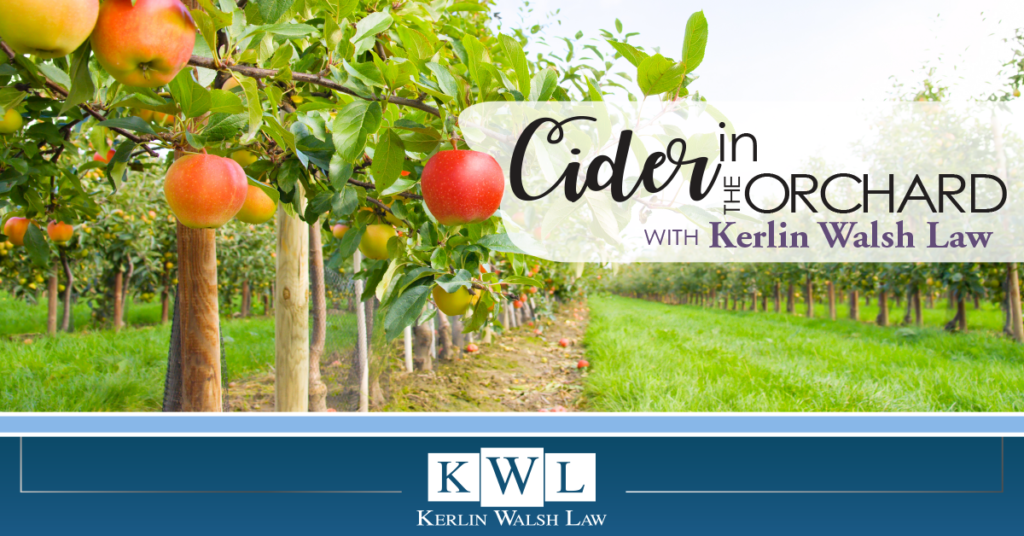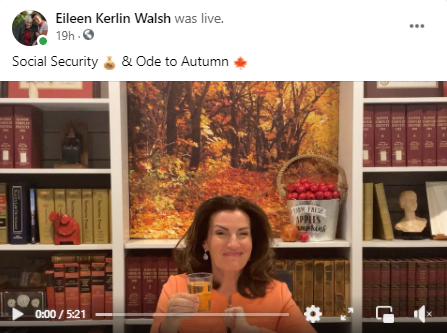In her first Facebook Live of the Fall season, Cider in the Orchard, Eileen Kerlin Walsh shared information about Social Security and an Ode to Autumn.
Welcome to our new fall theme, Cider in the Orchard with Kerlin Walsh Law.
Social Security strategies can make a huge difference to your retirement income. It is not the Social Security Administration’s job or even in their best interests to discuss the strategy that’s of the most value to you, so you need to educate yourself on Social Security and what that can mean for you.
The first big decision is when you take it. You could take it at 62 which is early. If you take it at 62 of course you’re going to get a reduced benefit; your full benefit at 67; and then you get an extra benefit if you wait until 70. Depending on what your other retirement income is and your health, waiting until 70, if you can, is a huge financial benefit.
If you qualify for the maximum benefit which is in the region of $3,000, the difference between 62 and 70 would be $21,000 per year.
Now we are living that extra decade. I can tell you, it’s real. I see 90-something’s in my office all the time. Given that we now have the strong possibility of living to these later decades, that $21,000 a year can add up to hundreds of thousands of dollars to your retirement income.
Many of us worry about outliving our money. Being able to wait that little bit extra time, plan to work a little bit longer, or to live off some of your other retirement income, can be a really clever strategy.
There are other things to know about, too.
Spousal benefits. Did you know that if maybe you’re a stay-at-home mom, you have a limited number of credits, your benefit is going to be very small. If it’s less than 50% of your spouse’s benefit you can claim 50% of that benefit, rather than the small benefit that you would get if you didn’t do so.
Survivor benefits. You can claim 100% of your spouse’s benefit if they predeceased you.
Here’s something that I think is fascinating regarding divorce. Did you know that if you were married for at least 10 years and you’ve been divorced for two, you can claim that spousal benefit we spoke of, for your former spouse’s income. It doesn’t affect your former spouse. It doesn’t affect any future spouses they had. They don’t even need to know. It’s something you’re entitled to and that is something very few people know about. I think there’s going to be some of you in the audience that are going to think, “My oh my, I might be able to take advantage of that!”
The moral of the story is it’s not just a matter of retiring walking, into the Social Security office, collecting your gold watch and deciding that you’re going to just sign on the dotted line and start getting your benefits. It can make a huge difference and it’s up to you to decide to educate yourself.
A great source for that education is your financial planner. It’s in their wheelhouse. They know what strategies are. They’ll know what your financial future is. They know what your needs are. They know what your various sources of income are. Your financial planner will know about these strategies to make sure that you figure out the best strategy for you. It can make you a lot of money in your retirement.
I am going to leave you today, now that we’re in fall officially and we have our new fall theme, with one of my favorite poems of all time, by John Keats.
To Autumn
Season of mists and mellow fruitfulness,
Close bosom-friend of the maturing sun;
Conspiring with him how to load and bless
With fruit the vines that round the thatch-eves run;
To bend with apples the moss’d cottage-trees,
And fill all fruit with ripeness to the core;
To swell the gourd, and plump the hazel shells
With a sweet kernel; to set budding more,
And still more, later flowers for the bees,
Until they think warm days will never cease,
For summer has o’er-brimm’d their clammy cells.
Isn’t that just lovely?
Thank you for watching, and I will see you next week for Cider in the Orchard with Kerlin Walsh Law.



